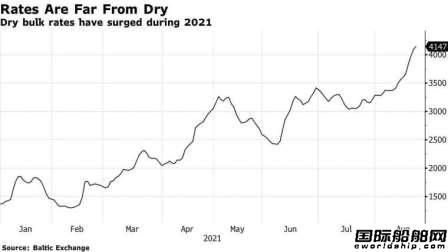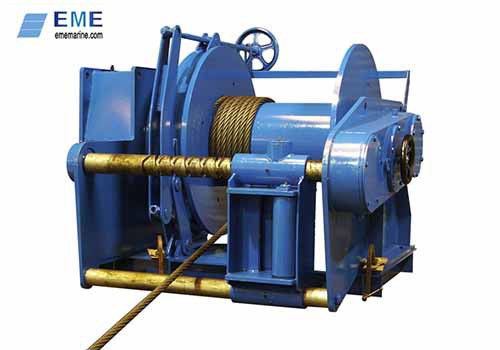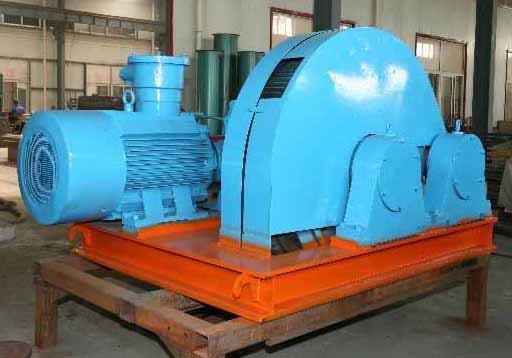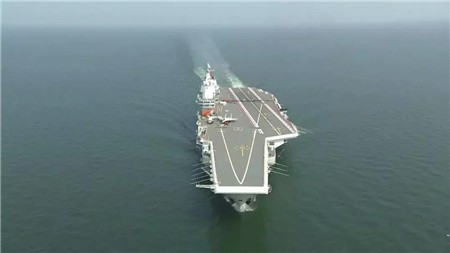

After breaking through the 4000 point mark last Friday, the Baltic Dry Bulk Freight Index (BDI) reported 4147 points on Monday, rising for the tenth consecutive trading day, setting a new 11-year high again. Rising freight rates may become the "new normal" in the dry bulk shipping market.
On August 23, the BDI index rose by 1.34% month-on-month to 4147 points, the highest since May 2010. Among them, the Baltic Capesize bulk carrier freight index (BCI) increased by 1.95% month-on-month to 6114 points, a 12-year high, and the Capesize freight rate rose by 2% to 50708 US dollars/day, the highest level since at least 2014.

The forward price shows that the bulk carrier freight rate is still bullish. Jan Rindbo, CEO of Danish shipping company D/S Norden, which has a history of 150 years and operates more than 500 ships, pointed out: “Earlier this year, the industry thought that the surge in freight rates was only a short-term phenomenon, but now it is beginning to be regarded as a more serious phenomenon. Structured, longer-term market."
As the economy recovers from the devastation caused by the epidemic, the market demand for raw materials such as coal and iron ore has surged this year, greatly surpassing the rate of fleet expansion. The epidemic has further reduced the number of available ships and exacerbated the problem of tight capacity supply. The market is beneficial to shipowners.
Clarkson’s research data shows that this year’s iron ore seaborne trade is expected to increase by 4% to 1.56 billion tons, the largest annual increase since 2017. In 2021, dry bulk trade is estimated to increase by 4.2% annually, and in 2022, it is estimated to increase by 1.7% annually. On the other hand, the bulk carrier capacity is estimated to increase by 3.3% this year and 1.4% next year, which is far behind the increase in cargo volume.
Iron ore is a major driving force for the rapid rise in the dry bulk market this year. George Lazaridis, head of research and evaluation at shipbroking company Allied Shipbroking, believes that this bull market still has growth momentum. Global steel demand remains strong and is expected to remain at least until 2022. There are few new dry bulk carriers, and the proportion of new orders in the fleet is currently the lowest in history. Therefore, the dry bulk shipping market is expected to continue to rise.
DNB Bank analyst Joergen Lian said: “The dry bulk market looks very optimistic. Since last summer, the market has been brewing a recovery, and this year’s recovery in global trade has accelerated the recovery.”
Pareto Securities shipping analyst Eirik Haavaldsen pointed out that as long as the bulk commodity market remains strong, bulk carrier freight rates may remain firm. With the approach of winter in the northern hemisphere, coal imports have surged, and freight rates will continue to rise for the rest of 2021.
Joakim Hannisdahl, chief analyst at Cleaves Securities, firmly believes that, taking into account factors such as the construction cycle of new ships, the dry bulk shipping market will continue until 2023.
The current boom in the dry bulk shipping market has encouraged ship owners. Khalid Hashim, executive director of Precious Shipping, a well-known dry bulk shipping company, also believes that the soaring demand for raw materials has not reached the ceiling, and the strict anti-epidemic measures at Chinese ports have increased ship delays and blocked ports. As a result, the effective supply of ships will decrease, and freight rates will continue to rise.
However, there are signs that bulk carrier transactions have slowed recently. Allied's latest weekly report stated that although dry bulk cargo trading is still active, the market has cooled off. Allied Shipbroking said that the strong earnings of the dry bulk shipping industry are indeed exciting, and the market is expected to continue to rise. However, as the global new crown epidemic, especially the Delta variant virus, surges, it is still necessary to be alert to risks. The so-called "post-epidemic" era is still very fragile. .
Analysts believe that when the economic trend is uncertain, one should be wary of "over-investment." Excessive new shipbuilding activities will trigger a new imbalance between supply and demand. If the global macro-economy declines and the demand for commodities is insufficient, increasing investment in the future production level of raw materials will increase price pressure. Therefore, it is “safe” to follow the trend in the short term, but in the long run it must be cautious.





